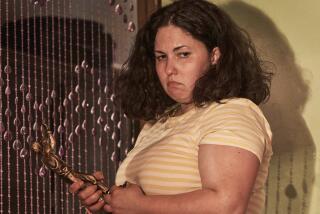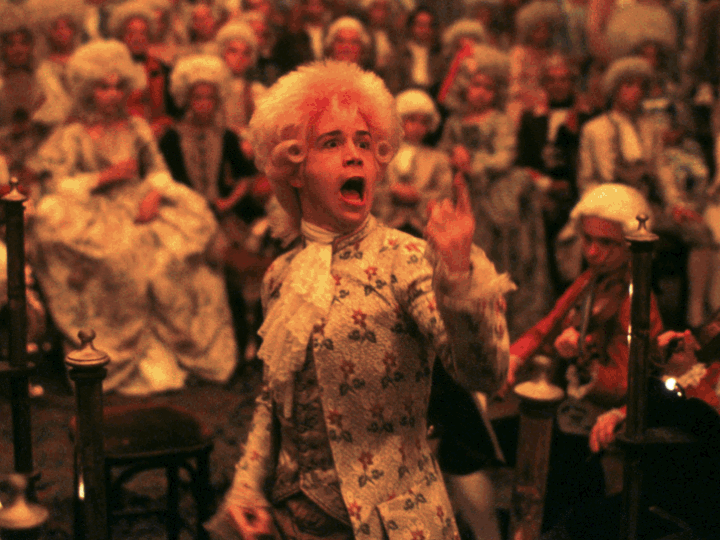A Hit in His Day
Comedian-singer Eddie Cantor was as beloved an American institution as his contemporaries Jack Benny and George Burns, and if he isn’t as well-remembered today, it’s because he was the first to pass away, in 1964 at age 72. A diminutive dynamo known for his bright, rolling “banjo eyes,” Cantor became a major Florenz Ziegfeld star, and the legendary impresario transferred two of Cantor’s biggest Broadway hits, “Kid Boots” and “Whoopee!,” to the screen.
Singer-songwriter Brian Gari, Cantor’s grandson, will present a rare surviving print of “Kid Boots” (1926) at the Silent Movie Friday through Sunday at 8 p.m., with matinees Sunday at 1 and 4 p.m. Whereas “Whoopee!” (1930), an early talkie in two-strip Technicolor, is virtually a film record of a stage production, “Kid Boots” is a madcap silent farce, directed by Paramount’s ever-reliable Frank Tuttle, that never betrays its theatrical origins.
As an entertainer who had his greatest success on stage, radio and TV rather than in films, Cantor proved to be a natural mime and teamed sensationally well with Clara Bow. An amusingly devised plot finds feckless tailor Cantor caddying for handsome Lawrence Grey, who has his reasons to go undercover as a golf pro at a mountain resort, where Cantor falls for swimming instructor Bow, and Grey for the resort owner’s beautiful daughter (Billie Dove).
Various plot strands come together in a literal cliffhanger, and “Kid Boots,” which Tom Gibson and Luther Reed deftly adapted from the Otto A. Harbach-William Anthony McGuire play, remains timelessly hilarious. 611 N. Fairfax Ave., L.A. (323) 665-2520.
Among the films screening at the Egyptian in the American Cinematheque’s ongoing “Recent Spanish Cinema” series is Catalan director Marc Recha’s stunning “Pau and His Brother” (Sunday at 5 p.m.), a work at once economical yet leisurely in pace, a richly evocative work that attests to Recha’s understanding and respect for the power of the camera.
Little is said in the film’s first half. A young chef, Pau (David Selvas), learns that his brother Alex, who went to work on a highway construction project in the Pyrenees, has inexplicably committed suicide. He and their equally grief-stricken mother Merce (Alicia Orozco) journey to the distant, almost deserted town where Alex had been living at the same time Marta (Nathalie Boutefeu) is heading there from Toulouse to see her father Emili (Luis Hostalot), who is Alex’s boss and whom she has not seen since she was a small child. Also on her way is Sara (Marieta Orozco), Alex’s beautiful girlfriend, who had been waiting for him to return.
Recha recalls the early films of Stan Brakhage in his joyous reverence for nature--they both understand the glory of natural light--as well as Michelangelo Antonioni in his willingness to hold a shot to allow its beauty and meaning to sink in. Another Antonioni echo is in his elliptical style. Beyond learning that Alex became increasingly depressed while working on the highway, perhaps seeing it as a violation of a region of unspoiled natural beauty, we never know why he took his life.
The point for Recha is that in the face of death the best thing to do is to celebrate life, the closer to nature the better--which is what these attractive, likable people do, with tenderness and exuberance. “Pau and His Brother.” Lloyd E. Rigler Theater at the Egyptian, 6712 Hollywood Blvd., Hollywood. (323) 466-FILM.
Meanwhile, the UCLA Film Archives’ annual “Contemporary Latin American Films” series gets underway Saturday with Alfonso Cuaron’s “Y Tu Mama Tambien,” a box office smash and yet another major work that attests to the rebirth of the Mexican cinema.
Cuaron casts a satirical eye on a rapidly changing society as two youths, Tenoch (Diego Luna) and his best friend Julio (Gael Garcia Bernal), take off on an impromptu summer holiday with the lovely Luisa (Maribel Verdu), wife of Tenoch’s cousin, a pompous, philandering intellectual. This is a classic coming-of-age tale, with a pair of brash but likable teenagers learning about sex and life from a wise and sophisticated older woman, but it is told with uncommon depth and wide-ranging implications. It screens at 7:30 p.m. in Melnitz Hall’s James Bridges Theater, UCLA campus. (310) 206-FILM.
Apollo Cinema presents a program of the Oscar-nominated live-action and animated shorts beginning tonight at 7:30 at the Monica 4-Plex, where it will run as two separate 70-minute segments at 11 a.m. Saturdays and Sundays through April.
Except for Cordell Barker’s “Strange Invaders,” an unsettling and venturesome tale of a childless couple whose yearning for parenthood has unforeseen consequences, the animation nominees are unexceptional.
The live-action category, however, holds two standouts. Virgil Widrich’s witty, surreal “Copy Shop,” which concerns the dire consequences that result when a copy shop proprietor accidentally places his hand in his copier machine.
Slawomir Fabicki and Bogumil Gofrejow’s “A Man Thing” is a harrowing, sensitively wrought vignette about a 13-year-old boy who is trapped between a brutal, abusive father and a soccer coach who insists that the youth play at the expense of his studies. 1332 2nd St., Santa Monica. (310) 394-9741.
On May 7, 2000, a 65-year-old white woman was shot at a Jacksonville, Fla., Ramada Inn by a black man, in front of her husband. At about the same time, 15-year-old Benton Butler was passing by, on his way to fill out a job application at a Blockbuster store. The husband, later seeing the boy in the back seat of a police car, identified him as his wife’s murderer.
Jean-Xavier de Lestrade’s Oscar-nominated documentary, “Murder on a Sunday Morning,” begins a one-week run of daily 10:30 a.m. showings Friday at the Sunset 5. As Lestrade follows public defenders Patrick McGuinness and Ann Finnell preparing for Butler’s trial, his film develops the suspense and tension of a classic fictional courtroom drama. “Murder on a Sunday Morning” soon becomes all the more riveting because it is the real thing: a step-by-step probe of the American justice system and what it reveals about our society under pressure. 8000 Sunset Blvd., West Hollywood. (323) 848-3500.
More to Read
Only good movies
Get the Indie Focus newsletter, Mark Olsen's weekly guide to the world of cinema.
You may occasionally receive promotional content from the Los Angeles Times.










